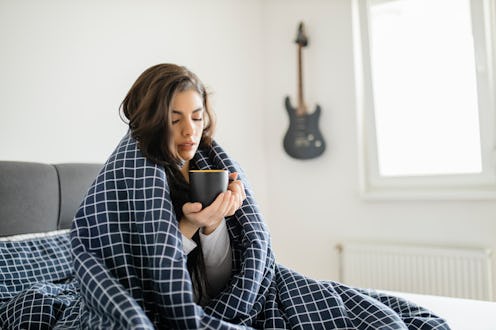Health
What To Do About Your Post-Vax Chills
Very much not *that* kind of chill.

You’ve got your first vaccine dose, absolutely buzzing with the prospect of immunity — and then spend the night wracked by chills so severe you feel like you’re in a snow drift. Shivers are a known side effect of several COVID vaccines, including Pfizer, Moderna, Johnson & Johnson, and AstraZeneca (which is not authorized in the U.S.).
“It’s like the fifth day of the flu,” Angelica, 28, who received the AstraZeneca vaccine in the U.K., where it’s authorized, tells Bustle. But having the post-vaccine chills isn’t a bad thing. “The fact that your body is having side effects after your COVID vaccine, such as headaches, fevers, chills or body aches, is a good thing,” Dr. Vivek Cherian M.D., an internal medicine physician, tells Bustle. “It’s a sign your body is initiating a good immune response.”
What Causes Post-COVID Vaccine Chills?
As your immune system learns how to respond to COVID, it sends out its arsenal to fight against the new threat. Changing your body temperature is part of that equation. Your hypothalamus, the brain region that controls body temperature, ratchets up the heat in response to viruses. That can help to kill off germs by making your body too hot for pathogens to survive. Shivers are the body’s way of adjusting to this new higher temperature. Some data suggests that people who’ve had COVID before are more likely to experience minor side effects from mRNA-based COVID vaccines like Pfizer or Moderna, including chills.
How To Treat Chills As A COVID-19 Vaccine Side Effect
“It is safe to take Tylenol and ibuprofen after the vaccine if you develop fever, chills, or redness and pain at the injection site,” Dr. Teresa Bartlett M.D., senior medical officer at claims management company Sedgwick, tells Bustle. Both will help reduce pain and swelling, and will control or reduce your shivers. There’s not much you can do to stop the chills from happening, but vaccine side effects are only reported to last for about two to three days at the most.
“If you are having mild chills alone, it is reasonable to monitor them,” Dr. Natasha Bhuyan M.D., regional medical director of medical provider One Medical, tells Bustle. They could just go away in a few minutes or hours, without needing to take any medications. She doesn’t recommend you try to alleviate the chills by getting under piles of warm blankets, though; while you might feel cold, your body temperature is likely quite hot. Dr. Cherian says you should drink plenty of fluids and make sure you’re getting enough rest.
If you’re nervous about side effects, Dr. Bartlett say it’s not a good idea to pre-medicate before your first or second shot. The Centers for Disease Control & Prevention (CDC) recommend that you don’t take any NSAIDS, like Advil, or any anti-histamines before your vaccine shot. Dr. Bartlett says there’s a question about whether these medications might interfere with the effectiveness of the vaccines, so you should wait until side effects appear post-appointment to take them.
If you have any questions about what might happen after your vaccine appointment, Dr. Bhuyan recommends talking to your doctor before you go and get that much-coveted “I’m Vaccinated” sticker.
Correction: A previous version of this story misidentified a NSAIDS example. It has been updated with correct information.
Experts:
Dr. Teresa Bartlett M.D.
Dr. Natasha Bhuyan M.D.
Dr. Vivek Cherian M.D.